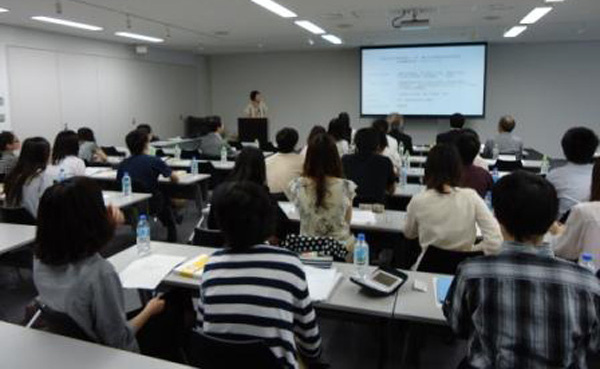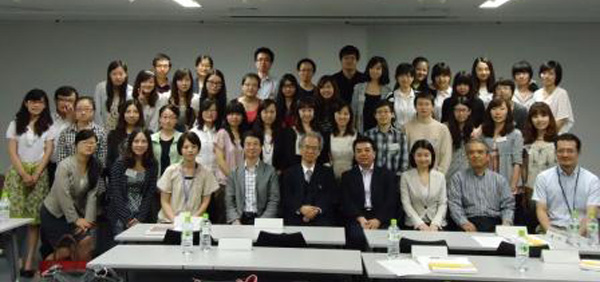Beijing Center for Japanese Studies: Mid-term Report on Study Period in Japan
Kumiko Inada
Asia and Oceania Section
The Beijing Center for Japanese Studies is an educational and research institution established in 1985, through negotiations between the Japan Foundation and the Ministry of Education of the People's Republic of China, for the purpose of developing human resources to promote Japanese language education and Japanese studies in China as well as cultural exchange with Japan. The center, which celebrated its 25th anniversary in 2010, now offers a master's and doctoral graduate program, and has a long record of achievements.
The curriculum for the master's course includes a study period in Japan, where students spend four months at universities throughout the country. Under the direction of teachers at the host institution, they collect research material and produce a draft of their thesis. The opportunity to pursue research under the guidance of instructors from both Japan and China is also one of the main features of the Beijing Center for Japanese Studies.
Usually the students come to Japan on March 31, but in 2011, due to the Great East Japan Earthquake, there was some concern about whether it would be possible to carry out the program. At a time when many foreign residents were leaving Japan for their home countries, students at the center were faced with the decision whether or not to come to Japan. After listening to reports on daily life from teachers dispatched from Japan, and program graduates who were studying in Japan, the students made up their minds to participate. Then, after convincing their worried families, all of the students decided to make the trip.
Until 2010, all the students would travel together to Tokyo, but they were divided into two groups in 2011: the eight students who were going to study at universities west of the Chubu area traveled via Kansai Airport on April 4, while the twelve students going to universities to the east of Chubu flew into Haneda Airport on April 14.
On June 17, a mid-term report on the study period in Japan was presented at the Japan Foundation Headquarters. A total of 34 students, members of the 25th class of the master's program, who were studying at universities throughout the country, assembled to report on their impressions of Japan, the lifestyle, and the progress of their research. The students appeared very excited to hear each other's comments.
Reflections on the Japan experience included: "Although I had studied Japanese and pursued Japanese studies for a long time, when I actually came here I realized the truth of the saying 'One look is worth hearing a hundred times.' I am really glad I came." "When I asked for directions, people would take me all the way to the place I was looking for. I was touched by the kindness of the Japanese." "Contact with great researchers spurs my own development. The environment in Japan helped me grow."
Even many of the comments that touched on concerns about the effects of the earthquake and the nuclear accident revealed a relaxed attitude: "I had never felt an earthquake in China so I was nervous at first, but I experienced about eight aftershocks, and handled it calmly." "I wasn't worried about daily life. My mother had given me a mask to take with me, but I ended up wearing it only twice."
In addition, there was plenty of opportunity for cultural exchange apart from studying. A student who joined a dance club said, "The most important thing I gained from the study period in Japan was making friends with Japanese people my own age, and getting to know what they are really like, through the club." Also fascinating were the reports from a student who felt closer to Japanese culture after practicing ikebana, and another for whom the sight of outdoor food stalls in Hakata was reminiscent of the streets of Beijing. The latter student got a laugh from the crowd with the remark "The food at the stalls in Hakata is impressive, but the prices are also impressive. When I get back home and see the street vendors in Beijing, I'm sure I'll look back fondly on my memories of Hakata." It was clear that the students were eager to enjoy Japan, not only in their studies, but also through exchanges in everyday life. The presentations left me feeling very encouraged.
The study period in Japan ended on August 2, and the students have already returned to China, where they are working on their theses, and looking forward to graduation ceremonies in January.
Student Comments
- I was surprised when I asked for directions and people would take me all the way to where I was going. Japanese people are really kind, I thought.
- I had never felt an earthquake before going to Japan, but I've already experienced about eight aftershocks. I was surprisingly calm, and didn't panic.
- I was inspired by the enthusiasm and independence of Japanese students with regard to their studies.
- In this study term, I felt how contact with excellent people spurs one's own development. I think that I've grown thanks to this environment where I'm surrounded by outstanding people.
- I've studied Japanese and pursued Japanese studies all along, but this was my first visit to Japan, and I realized the truth of the saying "One look is worth hearing a hundred times." I'm really glad I came.
- Exchange with international students from a variety of countries broadened my mind.
- When I saw the food stalls in Hakata, I thought it looked like a scene from Beijing, but the difference is that while the food at the Hakata stalls is impressive, the prices are impressive too. When I get back home and see the street vendors in Beijing, I'm sure I'll look back fondly on my memories of Hakata.
- We went to Kawaba Onsen hot spring many times as part of our fieldwork for research on the Yamba Dam. I loved the hot spring at first, but I think I've had enough.
- I made a lot of friends through exchange opportunities with Chinese students who are studying long-term at universities here. I learned a lot from hearing their thoughts about Japan and about China.
- The most important thing I gained from my study period in Japan was through participating in a dance club, where I was able to really become part of Japanese student society. By spending time close to Japanese young people, I was able to see what people in Japan are really like.
- At first I couldn't fit in with the Japanese students, but now I'm taking ikebana lessons, and I'm happy that it has helped me fit in little by little.
- When I went to church, the people around me were very kind, and when I got sick they gave me advice on various things.
- Although my dream of going to Tsinghua University in China did not come true, studying at the University of Tokyo let me enjoy that elite feeling.
- I went to the cherry blossom festival in Hirosaki during the 'Golden Week' holiday.
- Before coming to Japan, I was worried, but when I finally came, my worries disappeared. Back in my hometown, my mother had given me a mask to take with me, but I only used it twice.
Related Events
Back Issues
- 2026.1.23 Weaving Memories of …
- 2026.1. 6 How Japanese-Languag…
- 2025.12.25 Peace Actions Envisi…
- 2025.9.30 The 51st Japan Found…
- 2025.9.30 The Japan Foundation…
- 2025.9.30 Bringing the World C…
- 2025.9.30 The 51st (2024) Japa…
- 2025.9.30 Japan Foundation Pri…
- 2025.9.30 Japan Foundation Pri…
- 2024.5.24 The 50th Japan Found…



